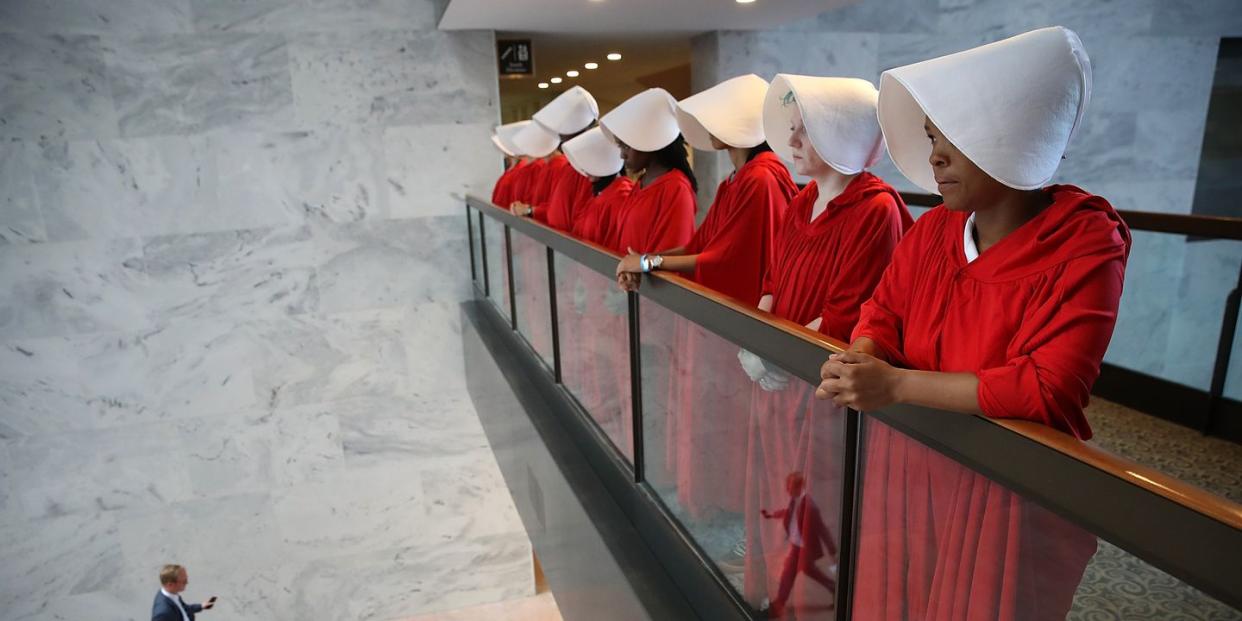Protecting Legal Abortion Is About More Than Women Dying. It's About Women Living.

Less than a day into the confirmation hearings for potential Supreme Court Justice Brett Kavanaugh, who would be in a position to overturn Roe v. Wade if appointed, a man helpfully chimed in to accuse female protesters of “hysteria.”
“People are going to pretend that Americans have no historical memory,” Nebraska Senator Ben Sasse (R-TK) said on Tuesday, “and supposedly there haven’t been screaming protesters saying, ‘Women are going to die’ at every hearing for decades.”
Having made a bold word choice, Sasse apparently decided to stick with it, repeating the word “hysteria” three more times: “The hysteria has nothing to do with [Kavanaugh],” he said; therefore, “we should ask what’s the hysteria coming from?” Only ignorance of the Supreme Court itself, he said, could explain “the hysteria around Supreme Court confirmation hearings.”

It takes a bit of doing to call advocates for women’s healthcare “hysterical” while simultaneously claiming they’re lacking in “historical memory.” The word “hysteria” comes from an ancient Greek theory that the uterus could wander around inside the body and cause insanity by clogging the pathways to the brain. One “cure” for this condition was “for women to be pregnant as often as possible to keep the ostensibly bored womb occupied, and therefore in its rightful place.” Millennia later, women still have to stage massive protests for their right not to be pregnant. The problem is not that we’re screaming too loudly. The problem is that it’s 2018 and we still have to scream.
Kavanaugh has played coy about his willingness to overturn Roe - “it has been re-affirmed many times over the past 45 years,” he says, without mentioning that those affirmations often hang on a single vote or clarifying whether he would vote against it- but nothing in his record indicates that he would support it. He’s vocally opposed Planned Parenthood v. Casey, which he himself cites as the most important “re-affirmation” of Roe v. Wade and the right to abortion, and suggested that Roe was “wrongly decided” as recently as 2017. And, in the event that Roe falls, anti-abortion groups are working to criminalize the procedure - including bills that would subject suspected abortion patients (in practice, anyone with a “suspicious” miscarriage) to imprisonment or capital punishment.
To the extent he holds anti-abortion views, Kavanaugh really is an existential threat to women, and anyone with a uterus. Women will, in fact, die. Women will be maimed, physically and spiritually. It is perfectly rational for women to be upset about that - or to demonstrate as loudly as possible in the hopes of blocking his nomination, which is, after all, a right supposedly granted to them as citizens within what I guess we’re still calling a democracy.
Banning abortion has never, actually, ended abortion. All it does is to create a black market, in which desperate patients seek out abortions from providers who may have no medical background and use wildly unsafe or even lethal procedures. It was a lack of safe late-term abortion providers in the US, for example, that led impoverished women of color to seek out the predatory quack Kermit Gosnell, a man who killed three newborns and one mother and called it “abortion care.”
Overturning Roe v. Wade will create a nation of Gosnells, and the casualties will rise. Globally, an estimated70,000 women per year die from unsafe abortions. The term “women” is a little misleading, because the people most likely to die from unsafe abortions are actually children - teenage girls, between 15 to 19, who are more likely to get pregnant because they have a harder time getting ahold of contraception. In the United States, particularly, we can safely predict that most of the casualties would also be poor - women living below the poverty line have similar difficulty affording contraception, and comprised 42 percent of all abortion patients in 2008. Many of the adult casualties will leave children behind; most abortion patients, 61 percent, are mothers who’ve had all the children they can afford.
Yes: Women are going to die. Women are already dying. We know what a world without legal abortion looks like: In Ireland, Savita Halappanavar died of blood poisoning after doctors refused to remove fetal tissue from her womb during a miscarriage. In El Salvador, a woman with lupus and kidney disease was forced to carry a pregnancy that doctors said would kill her - even after they also found that the fetus had not grown a skull or brain, and could not survive its own birth. (The fetus was ultimately removed via C-section when it was deemed “viable,” meaning the woman got to risk her own life for the reward of watching her child die.) And, yes, most women do survive unsafe abortions - but five million of them per year experience lifelong injuries, infections, and/or infertility as a result, making the injury rate 71 times greater than the death toll. If you can imagine any of this happening to your 15-year-old daughter - to anyone’s daughter, to any girl or woman you know - without screaming, let me know.
This is about more than women dying. It’s about women living; about the quality of life we can expect, the rights we are guaranteed as citizens within this country. This is about the brilliant 18-year-old who misses her first day at Harvard because she got pregnant over the summer; this is about the mother who’s forced to give birth to a child with no kidneys and who never forgets the look of pain on its face as it dies; this is about the woman desperately saving to provide a better life for the child she already has, only to watch her family spiral into a cycle of poverty after she’s forced to give birth to a second child she can’t afford. This is about the daughter growing up motherless, simply because her mother tried to end an unplanned pregnancy. This is about women being sidelined, burdened, silenced, sacrificed, women losing the people they could have been and the lives they could have led and the dreams and ambitions that used to keep them going, women working fewer hours for less pay and having to make the dollar stretch farther, simply because their government has decided they don’t deserve the right to control their own bodies.
Men invented “hysteria” out of a baffled contempt for women’s bodies and health needs, and have used it throughout history to convey that women’s emotional lives are incomprehensible and meaningless. It is a term that arises, like the opposition to Roe v. Wade itself, from a refusal to believe that women are worthy of empathy or concern. But if it’s not worth caring about the end of Roe, it’s not worth caring about women, period. The toll of female suffering we are facing is immense. It would be crazy not to be angry.
This is particularly true, given that there’s little that Democrats can do to block Kavanaugh. They don’t have the numbers. Those women screaming about Roe aren’t protesters, any more; they’re mourners. This is the funeral of the country women thought we had, the feminist progress we thought we’d made, and if you can’t shed a tear over the casket, then don’t show up. But it is deeply unwise to harm people and then deny them the right to a reaction. If Kavanaugh’s critics cannot make the GOP heed their pain, they may well make them feel their rage. If not now, then soon, in the many elections to come.
('You Might Also Like',)

